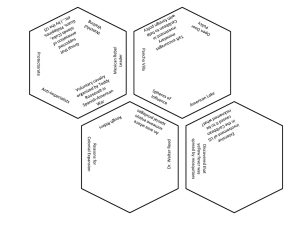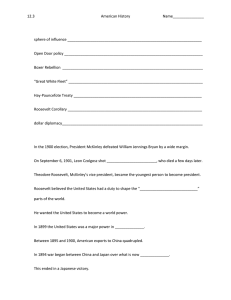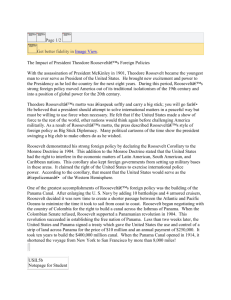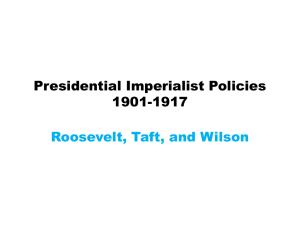Open Door policy Boxer
advertisement
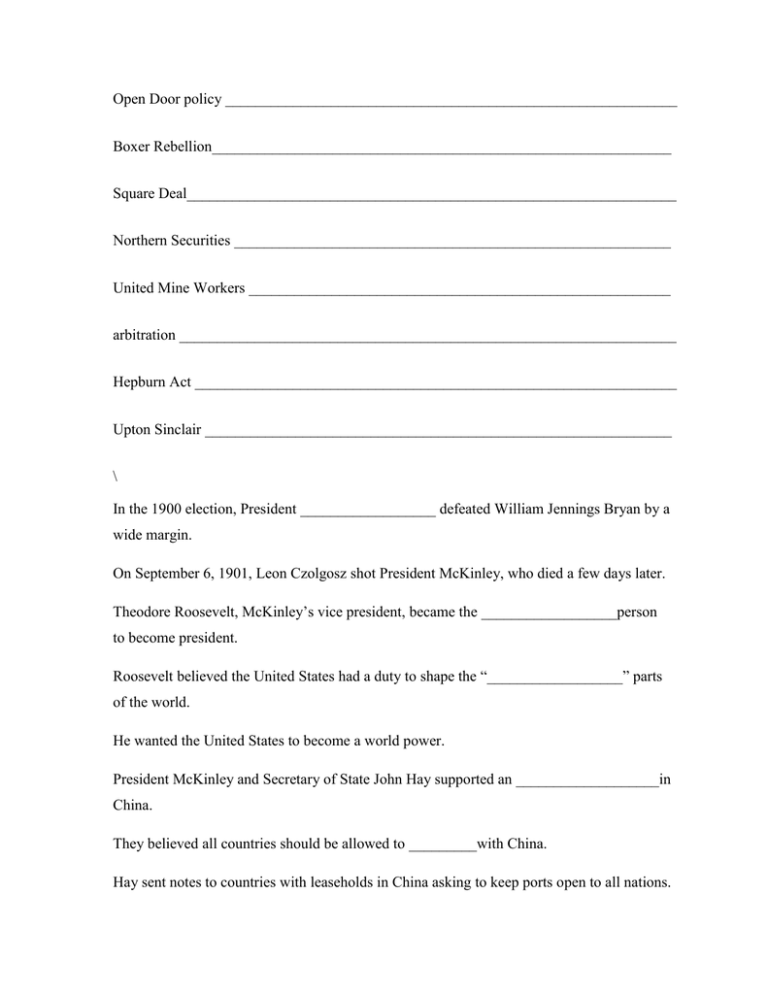
Open Door policy ____________________________________________________________ Boxer Rebellion_____________________________________________________________ Square Deal_________________________________________________________________ Northern Securities __________________________________________________________ United Mine Workers ________________________________________________________ arbitration __________________________________________________________________ Hepburn Act ________________________________________________________________ Upton Sinclair ______________________________________________________________ \ In the 1900 election, President __________________ defeated William Jennings Bryan by a wide margin. On September 6, 1901, Leon Czolgosz shot President McKinley, who died a few days later. Theodore Roosevelt, McKinley’s vice president, became the __________________person to become president. Roosevelt believed the United States had a duty to shape the “__________________” parts of the world. He wanted the United States to become a world power. President McKinley and Secretary of State John Hay supported an ___________________in China. They believed all countries should be allowed to _________with China. Hay sent notes to countries with leaseholds in China asking to keep ports open to all nations. Hay expected all powers would abide by this plan. Secret Chinese societies were organized to end foreign control. Members of the Boxers started the ___________________________. Group members invaded foreign embassies in Beijing and killed more than 200 foreigners and took others prisoner. An international force stopped the rebellion in August 1900. Theodore Roosevelt won the __________________ prize in 1906 for his efforts in ending the war between Japan and Russia. In 1901 the Hay-Pauncefote Treaty signed by the U.S. and Great Britain gave the United States exclusive rights to build and control any proposed canal through Central America. A _______________company that had begun to build a canal through Panama offered to sell its rights and property in Panama to the United States. In 1903 Panama was still a part of Colombia, which refused John Hay’s offer to purchase the land and gain rights to build the canal. Panamanians decided to declare their independence from Colombia and make their own deal with the United States to build the canal. The short _________________ against Colombia was supported by the United States, which sent ships to Panama to prevent Colombia from interfering. The United States recognized Panama’s independence, and the two nations signed a treaty to have the canal built. Construction of the 50-mile canal took _________ years. It shortened the distance from the Atlantic to the Pacific Ocean by about 8,000 nautical miles. During his second term, Theodore Roosevelt’s reform program was known as the __________________. As a progressive and a Social Darwinist, he felt the government should try to balance the needs of all the groups in American society. He believed that the U.S. needed __________________reforms to remain an efficient society that could compete successfully with other nations. The fight for control of the Burlington Railroad erupted on the New York Stock Exchange. E.H. Harriman of the Union Pacific Railroad and James J. Hill and J. P. Morgan of the Great Northern and Northern Pacific Railroads argued over _____________, which could have led to a recession. The three men compromised by creating a new holding company called Northern Securities. Roosevelt felt Northern Securities violated the Sherman Antitrust Act, and he ordered a __________________filed. In 1904 the Supreme Court ruled that Northern Securities had violated the Sherman Antitrust Act. The United Mine Workers (_________) union called a strike of the miners who dug coal. About 150,000 workers from the mines of eastern Pennsylvania demanded a pay increase, reduction in work hours, and recognition for their union. The strike went on for months, threatening a coal shortage. Roosevelt urged the union and owners to accept __________________, a settlement imposed by an outside party. The union agreed, but the owners did not. Mine owners finally agreed after Roosevelt threatened to have the army run the mines. In 1903 Congress created the Department of Commerce and Labor. Within the department was the Bureau of Corporations that had the authority to _________________corporations and issue reports on their activities. In 1906 the __________________Act was intended to strengthen the Interstate Commerce Commission (ICC) by giving it the power to set railroad rates. Over time, railroads realized they could work with the ICC to set rates and regulations that limited competition and prevent new competitors from entering the industry. By 1905 consumer protection became a ______________ issue. Patent medicines and food consumption became serious threats to Americans, forcing new legislation. In 1906 Upton Sinclair’s __________________ described his observations of Chicago slaughterhouses. As a result, federal legislation was passed. The _________Inspection Act required federal inspection of meat sold and set standards of cleanliness in meatpacking plants. The Pure _________and _________Act prohibited the manufacture, sale, or shipment of impure or falsely labeled food and drugs. President Theodore Roosevelt urged Americans to conserve natural resources. In 1902 Roosevelt supported the passage of the Newlands Reclamation Act, which authorized the use of federal __________________from public __________________sales to pay for irrigation and land development projects. Roosevelt’s actions during his presidency caused Americans to increasingly look to the federal government to solve the nation’s economic and social problems. The executive branch of government greatly _________________ in power.
